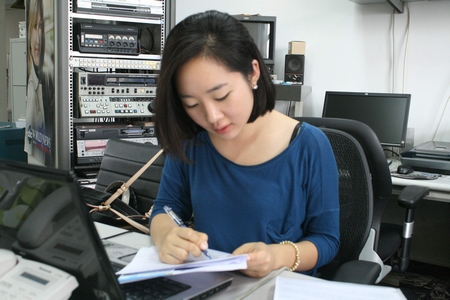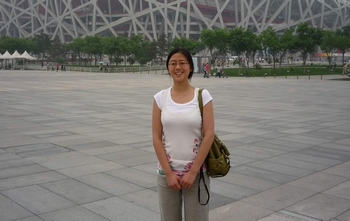Life and Leisure
Easy as ABC
By Guo Shuhan (China Daily)
Updated: 2010-08-25 14:01
 |
Large Medium Small |

Chinese major Monica Suk from Korea hopes to become a foreign correspondent and sees her internship at the Beijing bureau of ABC News as a great start. Photos provided to China Daily |
A growing number of second-generation Chinese students in the United States are taking up summer internships in the country. Guo Shuhan reports
Lulu Tsao remembers vividly her first taste of China in the summer of 1997, when she accompanied her father to Beijing where he took up a teaching assignment. The then 6-year-old, who was born in New York City and raised in New Jersey, refused to speak Chinese at first.
But the friends she made and the Chinese jokes she learned during her short stay gradually led her to enjoy speaking and reading the language. She recalls feeling very emotional while watching an adaptation of the Chinese classic Journey to the West on TV.
However, she says, no previous connection with the country can compare with her recent summer in Beijing. Like her, an increasing number of American-born Chinese (ABC) are seizing internships opportunities in a land they are bound to by blood, but know little about.
This June, Tsao, a freshman of Harvard University, majoring in chemical and physical biology, gave up a chance to intern with Merke, the world's second-largest pharmaceutical company, so she could come to Beijing.
"Interning here is a unique opportunity for me to go beyond reading about China and discovering her for myself," the 19 year old says.
"My parents want me to have the experience of living in China and learning more about her customs. Living alone here is an exciting adventure, and a great chance to practice my Chinese."
She cherishes every little experience - whether it be work-related like arranging business trips to Kunming, Yunnan province, and chatting with co-passengers, or taking a 22-km bike tour through the hutong, eating farm cuisine and hiking in Beijing's suburbs, catching performances at Laoshe Teahouse or A Dream of the Red Mansion at the National Center for Performing Arts. She says they all contribute to a well-rounded image of China.
Tsao is excited to find her Chinese adequate for daily communication, although it is not sufficient at work, where she finds taking notes hard and some terms in Chinese, confusing.

Lulu Tsao says no previous connection with the country can compare with her summer internship in Beijing. |
"It's harder to be a Chinese-American here than a foreigner, because everyone expects you to understand what they are saying and they are thrown off when you don't," Tsao says.
Improving their Chinese skills is a key motivation for youths like Tsao who have been raised in an English environment, but are considering taking up a job in the mainland.
Language competence, however, is far from enough.
Troy Wu speaks good Mandarin with a strong Wuxi accent from Jiangsu province, the birthplace of Wu and his father.
Wu says he feels "out of place" and is not sure he can deal with everyday challenges. For example, he says, personal relationships between colleagues are less casual than what he is accustomed to.
But the business analyst intern with an online search engine company, finds the "Western-style work environment" easy to fit into.
The junior from Stanford University landed in the US when he was 5. His first trip home was in 2008 when he toured Beijing, Shanghai and his birth city before the Olympic Games.
It took him a while to take in the modern scene, which was in marked contrast to his faint memories.
The 20-year-old keeps up with news on China and enjoys sharing his parents' sweet memories of their hometown.
This summer is the second time Jackie Wei, 17, has done an internship in Beijing.
The high school sophomore, who went to the US when she was 7, is looking at a career in journalism and worked for the Beijing bureau of a media company.
"It's a way to keep in touch with my grandparents and other family members," Wei says. "I come back to the mainland nearly every year."
China's growing global clout, Tsao believes, is fueling growing interest in internships on the Chinese mainland not just among second-generation Chinese but also foreigners.
She says Chinese is a popular language to study at American universities. Many of her schoolmates selected it to fulfill their language requirement in freshman year.
Her university offers a series of internship programs, in co-operation with Chinese or transnational corporations based in Beijing and Shanghai, to encourage students to experience a different culture.
Monica Suk is a 22-year-old from Korea with a major in Chinese.
Since elementary school, Suk has been attending after-school classes to learn Chinese for four hours every week.
She met swarms of foreigners in the year of the Olympics, who were in China either for language learning like her or for other fields of study, making her even more confident about her choice of major.
She hopes to become a foreign correspondent and sees her Beijing internship with a media company as a great start.
"I see many students around me trying to look for a job opportunity in China but they are deterred by language issues and the fear of living in another country," Suk says.
"My Dad always told me China was going to become prosperous and insisted that I take Chinese as my major. Now I feel even more strongly that this was wise counsel."